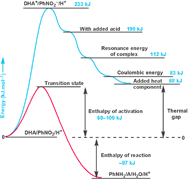Investigations into the mechanism of action of nitrobenzene as a mild dehydrogenating agent under acid-catalysed conditions
Abstract
Protonated

* Corresponding authors
a FCT, Universidade do Algarve, Campus de Gambelas, Faro 8000, Portugal
b Departamento de Quimica, Universidade de Coimbra, Coimbra 3000, Portugal
c Department of Chemistry, University of Liverpool, Liverpool, UK
d Escola Superior Agraria, IPC, Bencanta, Coimbra 3040, Portugal
Protonated

 Please wait while we load your content...
Something went wrong. Try again?
Please wait while we load your content...
Something went wrong. Try again?
M. L. S. Cristiano, D. J. P. Gago, A. M. d'A. Rocha Gonsalves, R. A. W. Johnstone, M. McCarron and J. M. T. B. Varejão, Org. Biomol. Chem., 2003, 1, 565 DOI: 10.1039/B210887A
To request permission to reproduce material from this article, please go to the Copyright Clearance Center request page.
If you are an author contributing to an RSC publication, you do not need to request permission provided correct acknowledgement is given.
If you are the author of this article, you do not need to request permission to reproduce figures and diagrams provided correct acknowledgement is given. If you want to reproduce the whole article in a third-party publication (excluding your thesis/dissertation for which permission is not required) please go to the Copyright Clearance Center request page.
Read more about how to correctly acknowledge RSC content.
 Fetching data from CrossRef.
Fetching data from CrossRef.
This may take some time to load.
Loading related content
